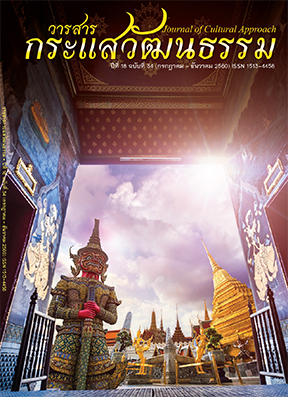Strengthening Human Capital for Community-Based Tourism of Esan-Lanna Community for promoting Sustainable Tourism
Main Article Content
Abstract
Strengthening Human Capital for Community-Based Tourism of Esan-Lanna Community has purposed to 1) Analyze current situation, problems and potential of Community Based on tourism of Esan-Lanna 2) Develop the human capital potentials in tourism fields to promote sustainable tourism. The research is a qualitative research. This research scope focuses on Esan-Lanna Community Chiang Saen District, Chiang Rai, which studied from documents, academic journals and field trip with collection from selected group which included community leaders, homestay owners, restaurant owners, grocery owners, agriculture product owners, local specialists and local seminar master altogether for 19 people. The data is collected by in-depth interview, small group discussion and a focus group discussion which used structured interviews and semi-structured method record form of group discussion, observation of participation and content analysis. The study indicated that Strengthening Human Capital for Community-Based Tourism of Esan-Lanna Community are 1) sharing information 2) income distribution and fair benefits 3) to make the community feel own and to participate in development 4) to promote the managing system to facilitate the learning process between villagers and visitors through tourism activities 5) Community Networking
Article Details
Proposed Creative Commons Copyright Notices
1. Proposed Policy for Journals That Offer Open Access
Authors who publish with this journal agree to the following terms:
- Authors retain copyright and grant the journal right of first publication with the work simultaneously licensed under a Creative Commons Attribution License that allows others to share the work with an acknowledgement of the work's authorship and initial publication in this journal.
- Authors are able to enter into separate, additional contractual arrangements for the non-exclusive distribution of the journal's published version of the work (e.g., post it to an institutional repository or publish it in a book), with an acknowledgement of its initial publication in this journal.
- Authors are permitted and encouraged to post their work online (e.g., in institutional repositories or on their website) prior to and during the submission process, as it can lead to productive exchanges, as well as earlier and greater citation of published work (See The Effect of Open Access).
Proposed Policy for Journals That Offer Delayed Open Access
Authors who publish with this journal agree to the following terms:
- Authors retain copyright and grant the journal right of first publication, with the work [SPECIFY PERIOD OF TIME] after publication simultaneously licensed under a Creative Commons Attribution License that allows others to share the work with an acknowledgement of the work's authorship and initial publication in this journal.
- Authors are able to enter into separate, additional contractual arrangements for the non-exclusive distribution of the journal's published version of the work (e.g., post it to an institutional repository or publish it in a book), with an acknowledgement of its initial publication in this journal.
- Authors are permitted and encouraged to post their work online (e.g., in institutional repositories or on their website) prior to and during the submission process, as it can lead to productive exchanges, as well as earlier and greater citation of published work (See The Effect of Open Access).
References
[2] Baum, T. (2007). Progress in Tourism Management Human Resources in Tourism: Still Waiting for Change. Tourism Management, 28, 1383-1399.
[3] Cohen, J. M. & Uphoff, N. T. (1980). Participation’s Place in Rural Development: Seeking Clarity through Specificity. World Developments, 8, 213-235.
[4] Corbin, J., & Strauss. (2008). Basic of Qualitative Research. London, England: Sage
[5] Creswell, J.W. (2009). Research design: Qualitative, Quantitative and Mixed Methods Approaches. 3rd ed. Los Angeles: sage
[6] Erwin, W. (1976). Participation Management: Concept, Theory and Implementation. Atlanta.
[7] Gatewongsa, Krittayawadee., Buapaun, Nakarn., & Pethjul, Siwawong. (2012). Community Strengthening Among the Changes by a Grounded Theory Study: A Case Study of the Farmer Community School. Lampang Rajabhat University Journal, 1(1), 12-24.
[8] Goodwin, H. & Santilli, R. (2009). Community-Based Tourism: A Success?. ICRT Occasional Paper 11, 1-37.
[9] Kasai, Praweena., & Phansita, Nalinee. (2016). The Needs of Training and Development and Career Planning of Dusit Thani College’s Instructors. Journal of Dusit Thani College, 10(2), 77-92.
[10] Kornpetpanee, Suchada., Suksawang, Poonpong., Varakantsiri, Wanlada., Seesai, Supparak., & Thiamtham Thuttarit. (2007). Community Participation in Managing the Impact of Firefly Tourism in Khlong Amphawa, Samut Songkhram Province. Journal of Education Research and Measurement Burapha University, 5(2), 118-135.
[11] Kusluvan, S., Kusluvan, Z., Ilhan, I., & Buyruk, L. (2010). The Human Dimension A Review of Human Resources Management Issues in the Tourism and Hospitality Industry. Cornell Hospitality Quarterly, 51(2), 171-214.
[12] Nelson, Nici & Wright, Susan. (1995). Power and Participatory Development: Theory and Practice. ITDG Publishing. ISBN 978-1853392412
[13] Okazaki, E. (2008). A Community-Based Tourism Model: Its Conception and Use. Journal of Sustainable Tourism, 16(5), 511-529.
[14] Prasongthan, Supapron. (2013). Social Capital Potentiality for Creative Community Based Tourism: The Study of Tai Puan Community, Pak Plee District, Nakron Nayok Province. Journal of Social Sciences, 16(January – December).
[15] Ryan, C. (1995). Research Tourist Satisfiction: Issues, Concepts, Problems. London, England: Routledge.
[16] Scheyvens, R. (2002). Tourism for development: Empowering communities. Pearson Education.
[17] Suansri, Potjana. (2003). Community Based Tourism Handbook. Bangkok: Tourism Project for Life and Nature. (in Thai)
[18] Tawinwadee, Bureekul (2008). Participation: conceptual theoretical framework. King Prajadhipok's Institute. (in Thai)
[19] Wedchayanon, Nisada. (2008). New Dimension in Human Capital Management (Managing Talent). Graduate School of Public Administration, National Institute of Development Administration.
[20] White, Alastair T. (1982). Why Community Participation? A Discussion of the Argument Community Participation: Current Issue and Lesson Learned. United Nations Children's Fund, 1-18.

